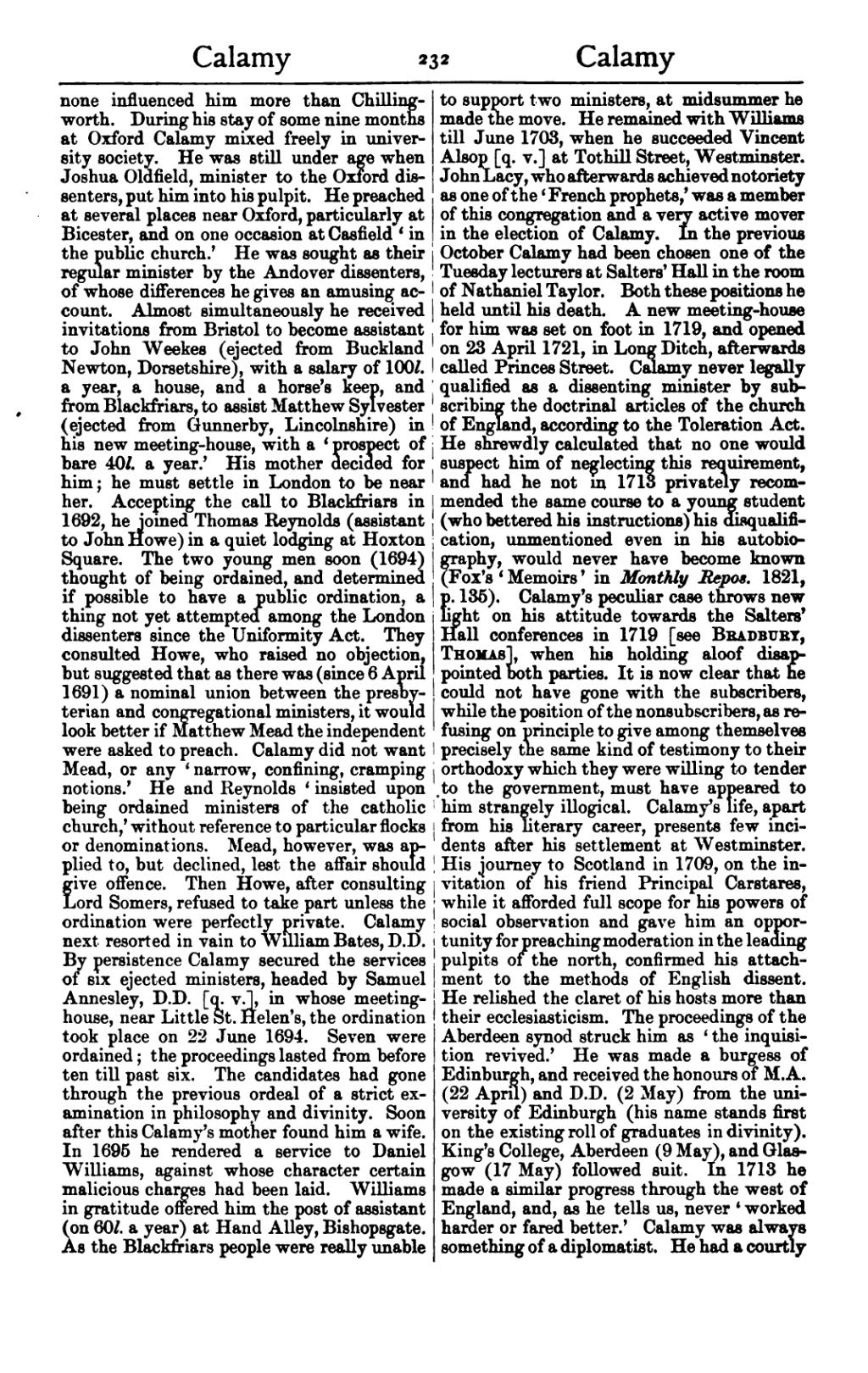none influenced him more than Chillingworth. During his stay of some nine months at Oxford Calamy mixed freely in university society. He was still under age when Joshua Oldfield, minister to the Oxford dissenters, put him into his pulpit. He preached at several places near Oxford, particularly at Bicester, and on one occasion at Casfield ‘in the public church.’ He was sought as their regular minister by the Andover dissenters, of whose differences he gives an amusing account. Almost simultaneously he received invitations from Bristol to become assistant to John Weekes (ejected from Buckland Newton, Dorsetshire), with a salary of 100l. a year, a house, and a horse's keep, and from Blackfriars, to assist Matthew Sylvester (ejected from Gunnerby, Lincolnshire) in his new meeting-house, with a ‘prospect of bare 40l. a year.’ His mother decided for him; he must settle in London to be near her. Accepting the call to Blackfriars in 1692, he joined Thomas Reynolds (assistant to John Howe) in a quiet lodging at Hoxton Square. The two young men soon (1694) thought of being ordained, and determined if possible to have a public ordination, a thing not yet attempted among the London dissenters since the Uniformity Act. They consulted Howe, who raised no objection, but suggested that as there was (since 6 April 1691) a nominal union between the presbyterian and congregational ministers, it would look better if Matthew Mead the independent were asked to preach. Calamy did not want Mead, or any ‘narrow, confining, cramping notions.’ He and Reynolds ‘insisted upon being ordained ministers of the catholic church,’ without reference to particular flocks or denominations. Mead, however, was applied to, but declined, lest the affair should give offence. Then Howe, after consulting Lord Somers, refused to take part unless the ordination were perfectly private. Calamy next resorted in vain to William Bates, D.D. By persistence Calamy secured the services of six ejected ministers, headed by Samuel Annesley, D.D. [q. v.], in whose meeting-house, near Little St. Helen's, the ordination took place on 22 June 1694. Seven were ordained; the proceedings lasted from before ten till past six. The candidates had gone through the previous ordeal of a strict examination in philosophy and divinity. Soon after this Calamy's mother found him a wife. In 1695 he rendered a service to Daniel Williams, against whose character certain malicious charges had been laid. Williams in gratitude offered him the post of assistant (on 60l. a year) at Hand Alley, Bishopsgate. As the Blackfriars people were really unable to support two ministers, at midsummer he made the move. He remained with Williams till June 1703, when he succeeded Vincent Alsop [q. v.] at Tothill Street, Westminster. John Lacy, who afterwards achieved notoriety as one of the ‘French prophets,’ was a member of this congregation and a very active mover in the election of Calamy. In the previous October Calamy had been chosen one of the Tuesday lecturers at Salters' Hall in the room of Nathaniel Taylor. Both these positions he held until his death. A new meeting-house for him was set on foot in 1719, and opened on 23 April 1721, in Long Ditch, afterwards called Princes Street. Calamy never legally qualified as a dissenting minister by subscribing the doctrinal articles of the church of England, according to the Toleration Act. He shrewdly calculated that no one would suspect him of neglecting this requirement, and had he not in 1713 privately recommended the same course to a young student (who bettered his instructions) his disqualification, unmentioned even in his autobiography, would never have become known (Fox's ‘Memoirs’ in Monthly Repos. 1821, p. 135). Calamy's peculiar case throws new light on his attitude towards the Salters' Hall conferences in 1719 [see Bradbury, Thomas], when his holding aloof disappointed both parties. It is now clear that he could not have gone with the subscribers, while the position of the nonsubscribers, as refusing on principle to give among themselves precisely the same kind of testimony to their orthodoxy which they were willing to tender to the government, must have appeared to him strangely illogical. Calamy's life, apart from his literary career, presents few incidents after his settlement at Westminster. His journey to Scotland in 1709, on the invitation of his friend Principal Carstares, while it afforded full scope for his powers of social observation and gave him an opportunity for preaching moderation in the leading pulpits of the north, confirmed his attachment to the methods of English dissent. He relished the claret of his hosts more than their ecclesiasticism. The proceedings of the Aberdeen synod struck him as ‘the inquisition revived.’ He was made a burgess of Edinburgh, and received the honours of M.A. (22 April) and D.D. (2 May) from the university of Edinburgh (his name stands first on the existing roll of graduates in divinity). King's College, Aberdeen (9 May), and Glasgow (17 May) followed suit. In 1713 he made a similar progress through the west of England, and, as he tells us, never ‘worked harder or fared better.’ Calamy was always something of a diplomatist. He had a courtly
